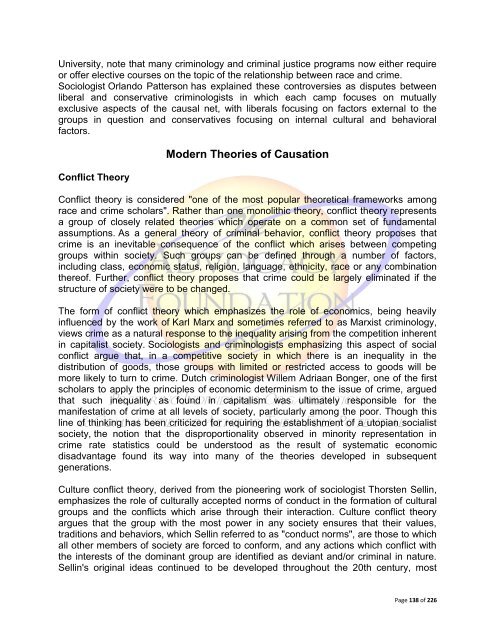Racial Profiling
Racial Profiling
Racial Profiling
You also want an ePaper? Increase the reach of your titles
YUMPU automatically turns print PDFs into web optimized ePapers that Google loves.
University, note that many criminology and criminal justice programs now either require<br />
or offer elective courses on the topic of the relationship between race and crime.<br />
Sociologist Orlando Patterson has explained these controversies as disputes between<br />
liberal and conservative criminologists in which each camp focuses on mutually<br />
exclusive aspects of the causal net, with liberals focusing on factors external to the<br />
groups in question and conservatives focusing on internal cultural and behavioral<br />
factors.<br />
Conflict Theory<br />
Modern Theories of Causation<br />
Conflict theory is considered "one of the most popular theoretical frameworks among<br />
race and crime scholars". Rather than one monolithic theory, conflict theory represents<br />
a group of closely related theories which operate on a common set of fundamental<br />
assumptions. As a general theory of criminal behavior, conflict theory proposes that<br />
crime is an inevitable consequence of the conflict which arises between competing<br />
groups within society. Such groups can be defined through a number of factors,<br />
including class, economic status, religion, language, ethnicity, race or any combination<br />
thereof. Further, conflict theory proposes that crime could be largely eliminated if the<br />
structure of society were to be changed.<br />
The form of conflict theory which emphasizes the role of economics, being heavily<br />
influenced by the work of Karl Marx and sometimes referred to as Marxist criminology,<br />
views crime as a natural response to the inequality arising from the competition inherent<br />
in capitalist society. Sociologists and criminologists emphasizing this aspect of social<br />
conflict argue that, in a competitive society in which there is an inequality in the<br />
distribution of goods, those groups with limited or restricted access to goods will be<br />
more likely to turn to crime. Dutch criminologist Willem Adriaan Bonger, one of the first<br />
scholars to apply the principles of economic determinism to the issue of crime, argued<br />
that such inequality as found in capitalism was ultimately responsible for the<br />
manifestation of crime at all levels of society, particularly among the poor. Though this<br />
line of thinking has been criticized for requiring the establishment of a utopian socialist<br />
society, the notion that the disproportionality observed in minority representation in<br />
crime rate statistics could be understood as the result of systematic economic<br />
disadvantage found its way into many of the theories developed in subsequent<br />
generations.<br />
Culture conflict theory, derived from the pioneering work of sociologist Thorsten Sellin,<br />
emphasizes the role of culturally accepted norms of conduct in the formation of cultural<br />
groups and the conflicts which arise through their interaction. Culture conflict theory<br />
argues that the group with the most power in any society ensures that their values,<br />
traditions and behaviors, which Sellin referred to as "conduct norms", are those to which<br />
all other members of society are forced to conform, and any actions which conflict with<br />
the interests of the dominant group are identified as deviant and/or criminal in nature.<br />
Sellin's original ideas continued to be developed throughout the 20th century, most<br />
Page 138 of 226

















